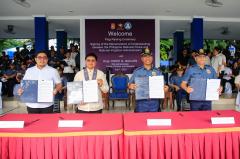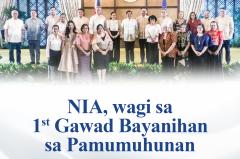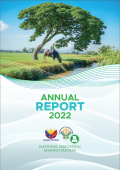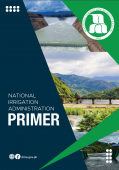
Calinog, Iloilo, Philippines – Inter-sectoral support for the implementation of Iloilo’s biggest and much-needed irrigation development project continues to broaden.
Dubbed Jalaur River Multi-Purpose Project Stage II (JRMP II), it is a significant ‘pipe-line’ project in Iloilo Province. It has since enjoyed the endorsement of Indigenous Peoples, farmers, national government agencies, Local Government Units (LGU), religious groups and the business sector.
In fact, no less than the members of the Panay-Bukidnon IP community called for support from the Duterte Administration to pursue the JRMP II. Saying “the implementation of the project will respect and recognize the stand and desire of the Panay-Bukidnon community for progress and peace”, the IPs wrote a manifesto addressed to President Rodrigo Duterte.
The two-page document was signed by 200 IP elders representing the 16 barangays (villages) that will be affected by the dam project. Gawad Manlilikha ng Bayan (National Living Treasure) and clan leader of the Caballero Family, Federico “Tay Pedring” Caballero led the signing of the manifesto. In full support too is Calinog town elected IP councilor Renato Casinao.
Year-round irrigation, potable water, renewable energy, employment and livelihood opportunities are among the ‘mega-benefits’ of JRMP II the IPs emphasized in the manifesto.
The project will irrigate 31,840 hectares of rice lands in Iloilo Province and will increase annual production of rice from 130,000 to 300,000 tons per hectare. It will further support the government’s thrust for rice self-sufficiency.
Apart from this, the JRMP II will provide bulk water supply for domestic and industrial use and hydroelectric power of 6.6 megawatts. It will also mitigate flooding in Calinog and nearby towns.
Furthermore, the project will create thousands of employment for IPs, farmers and other stakeholders.
The IPs further acknowledged the Free and Prior Informed Consent process undertaken by the National Irrigation Administration (NIA). “The JRMP II went through legal, transparent and genuine processes such as the FPIC of the Panay-Bukidnon”, the manifesto reads. “No less than the National Commission on Indigenous Peoples (NCIP) ensured that the process was in order and strictly implemented”.
JRMP II was granted by the NCIP with two Certification Preconditions. One was for the conduct of the feasibility study in 2012 and the other was for the construction of the project in 2015.
Since its beginning, JRMP II is for the inclusive development of both upland and lowland stakeholders. IP rights as enshrined by the Republic 8371 or Indigenous Peoples Rights Act (IPRA) of 1997 were duly considered in the plans and programs of the project. Environmental and social considerations were also made in accordance to the provisions of laws and international guidelines.
To further protect the interests of the Ilonggos, 27 national government agencies worked together to develop comprehensive infrastructure, livelihood, and basic social services for the stakeholders. This came after the IP stakeholders have requested for schools, roads, health centers, livelihood programs and other basic social services.
The manifesto was handed by the IPs to the office of Iloilo Governor Arthur D. Defensor Sr. for endorsement to the national government. Earlier in July, Agriculture Secretary Manny Piñol gave his “go” signal for the implementation of the project under the Duterte Administration.
JRMP II is an 11.2 billion pesos ($ 260.140 Million) irrigation project funded by the governments of the Philippines and South Korea. 8.951 billion pesos ($ 207.670 Million) will come from the Official Development Assistance of the Korean Economic Development Cooperation Fund (EDCF). The remaining 2.261 billion pesos ($ 52.470 Million) will be sourced from the funds of the Philippine Government. The project strengthens the partnership of both governments for inclusive rural development.

















